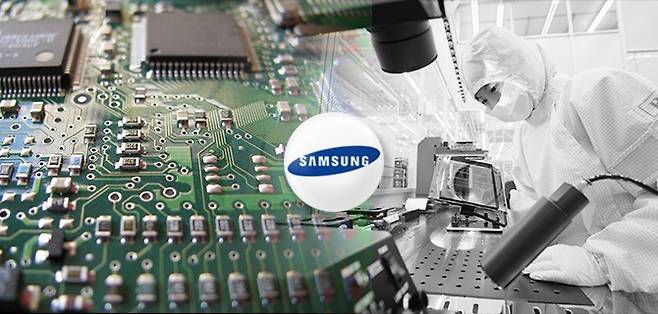Samsung Elec faces acute supply shortage for mobile chips
이 글자크기로 변경됩니다.
(예시) 가장 빠른 뉴스가 있고 다양한 정보, 쌍방향 소통이 숨쉬는 다음뉴스를 만나보세요. 다음뉴스는 국내외 주요이슈와 실시간 속보, 문화생활 및 다양한 분야의 뉴스를 입체적으로 전달하고 있습니다.

The Korean tech giant is behind meeting client orders for Exynos 2100, its latest mobile processor, and earlier Exynos 1080 chips due to limited 5-nanometer production lines.
Exynos 2100 powers the new Galaxy S21 series smartphones and Exynos 1080 China’s Vivo phones. The production setback could disrupt the rollout schedule of Galaxy S21.
The industry estimates the GalaxyS21 to sell 28 million to 30 million units worldwide this year, with Exynos 2100 to power 60 percent of them.
Finding replacements would not be easy as other global foundries including No. 1 Taiwan Semiconductor Manufacturing Co. (TSMC) are fully occupant.
Taiwan is expected to claim 64 percent of the world’s foundry market this year, with Korea a distant second at 18 percent, according to TrendForce, a data provider for the semiconductor industry.
Samsung Electronics makes up the bulk of 17 percent in the Korean share, followed by DB HiTek. Taiwan is home to not only TSMC but other big players including UMC, Powerchip Technology and Vanguard International Semiconductor.
The world’s foundry market is projected to generate sales of $89.7 billion in 2021, up 5.9 percent from the previous year.
Korean experts are calling for more investment in foundry to narrow the gap with Taiwan. But Samsung Electronics is currently held back by the legal risks of its Vice Chairman Jay Y. Lee.
Lee’s fate will be determined Monday when the Korean court makes a ruling on the bribery charges. Lee was convicted of bribing a confidante of former President Park Geun-hye and was jailed for five years in 2017. He served just one year in jail and walked out a free man after his sentence was reduced and suspended on appeal. The Supreme Court sent the case back to the Seoul High Court, which will announce its ruling on Monday.
Lee had vowed to invest 133 trillion won ($120 billion) in non-memory chips including foundry by 2030 to dominate both memory and non-memory sectors. The company bought a 1.04-million-square-meter plot of land in Austin, Texas with plans to start building a foundry there in 2022.
If Lee is jailed, other big investment plans could be put on hold.

The problem is money. It expects the 8-inch ramp-up to cost 700 billion won and the 12-inch installation to cost 1.2 trillion won to 1.4 trillion won. For a company whose annual sales are roughly 1 trillion won, financing is critical to fund such big investments.
SK Hynix System IC, a subsidiary of Korean chipmaker SK Hynix Inc., started volume production at its foundry in Wuxi, China last December. In April 2020, SK Hynix acquired MagnaChip’s foundry for 530 billion won.
But observers say SK Hynix’s foundry business is still in its fledgling stages and that it would take some time before it is ready to make large-scale investments.
Meanwhile, Taiwanese players are moving fast to further cement their foundry dominance.
TSMC said it plans to spend up to $28 billion this year in its foundry facilities, up 62 percent from last year. TSMC announced last May it would invest $12 billion to build a new U.S. plant in Arizona for the 5-nanometer manufacturing process.
Other Taiwanese foundries are ratcheting up their own investments. UMC said it will pour 1.1 trillion won into scaling up its 12-inch facilities and acquiring another 8-inch fab. Powerchip revealed it would inject 10.4 trillion won to build two 12-inch production lines at its plant in Taiwan later this year. VIS is also said to be weighing acquiring a fab while expanding its 8-inch facilities in Singapore.
[ⓒ Maeil Business Newspaper & mk.co.kr, All rights reserved]
Copyright © 매일경제 & mk.co.kr. 무단 전재, 재배포 및 AI학습 이용 금지
- Korea’s ELS issuance down 31% on year in 2020 - Pulse by Maeil Business News Korea
- Pharmicell makes impressive turnaround on Covid-19 test kit material - Pulse by Maeil Business News Korea
- S. Korea’s mid-tier game developers rush to roll out new titles - Pulse by Maeil Business News Korea
- Hyundai, Kia, each, ready $272 mn green bond offering in Feb - Pulse by Maeil Business News Korea
- Samsung Elec earns Common Criteria certification for 5G equipment - Pulse by Maeil Business News Korea
- 강경준, 상간남 피소…사랑꾼 이미지 타격 [MK픽] - 스타투데이
- 총선은 끝났지만…부동산 ‘폭풍전야’ [COVER STORY]
- “‘음악’으로 맺어진 ♥”…윤보미·라도, 8년째 열애 ‘인정’(종합)[MK★이슈] - MK스포츠
- 이찬원, 이태원 참사에 "노래 못해요" 했다가 봉변 당했다 - 스타투데이
- 양희은·양희경 자매, 오늘(4일) 모친상 - 스타투데이